This post contains affiliate links.
This article shares information about my pet chickens and answers the questions: do chickens make good pets; do chickens recognize their owner; do chickens get attached to humans; do chickens learn their names; do chickens let you pick them up; do chickens enjoy being held; do chickens like when you talk to them; and why you should sit with your chickens?
My chickens are wonderful pets, and the best part is that I do not have to worry about any of the problems that come with indoor pets, such as hair everywhere, accidents in the house, or damage to my furniture from scratching and chewing.
Do Chickens Make Good Pets?
Female chickens can make wonderful pets if provided with attention, the right care, proper housing, protection from predators, and some space to ensure they thrive in your backyard or urban setting. Roosters are less desirable as pets.
Chickens, once farm animals, have become delightful urban pets. Many suburban and city dwellers are now keeping chickens as pets, as long as local regulations allow it.
They need outdoor coops, balanced diets, and regular veterinary care. Chickens offer fresh eggs and require responsible pet ownership.
There are a variety of common chicken breeds that make good pets, including Silkies, Rhode Island Reds, Easter Eggers, Plymouth Rocks, Sussexs, Leghorns, Americaunas, and Orpingtons. Each breed presents with a distinctive appearance, size, and personality.
Chickens are typically smaller than 2 feet in length and weigh on average 5 pounds, depending on the breed. Each chicken will lay 4-6 eggs a week with the proper calcium and protein diet.
See my article: Eggsplore the World of Chickens Laying Eggs
As they cannot be housebroken, chickens require outdoor chicken coops, preferably with accompanying separate runs for space to wander.
As a general guideline, each chicken requires at least 3 to 5 square feet of room in a coop. The coop needs to be predator-proof and provide a feeding area, water trough, roosting areas, nesting boxes, and bedding for the floor. Adequate airflow is essential through ventilation for temperature control.
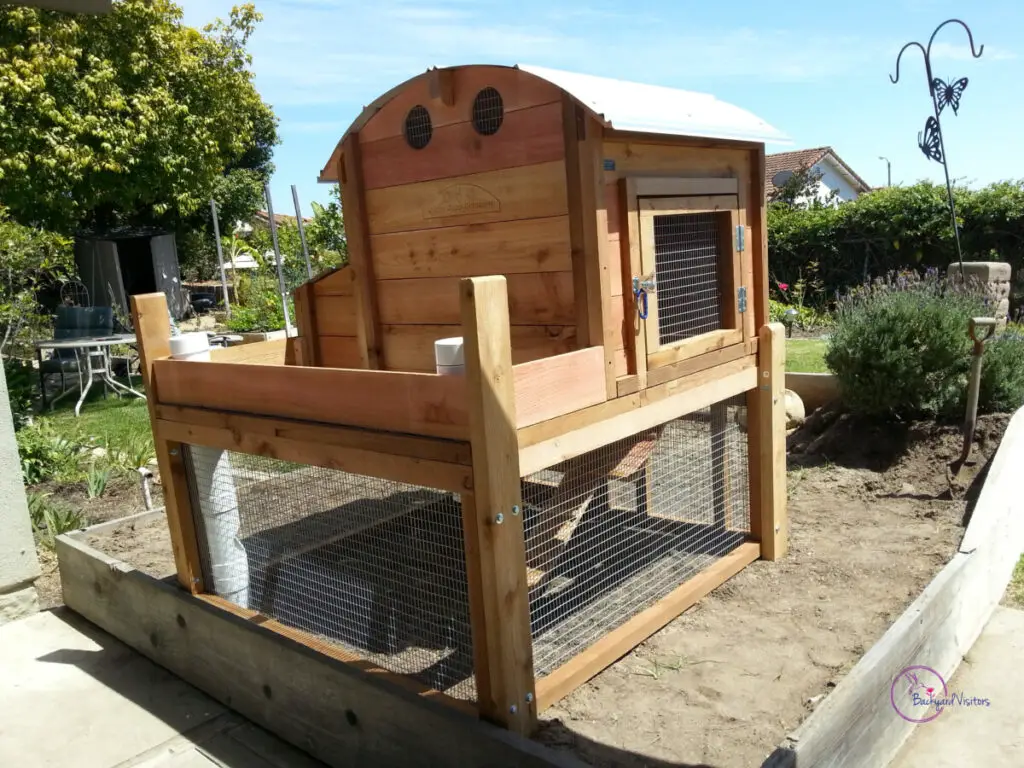
This is the chicken coop I started with for my five chickens. A bit expensive for a beginner coop at $900, unless you are very sure of your commitment to raising chickens as pets long-term; they can live for up to ten years.
I think it wise to start with 4-5 hens, as the likelihood of losing one or two hens in the first couple of years is something that frequently happens.
While I allowed my chickens to free-range in my yard when I was in my backyard, I did not let them free-range unattended for fear of losing them to the hawks, and there were several instances of them being eye-balled by hawks watching them while perched in nearby trees.
I would suggest the addition of a covered chicken run if you cannot be in the backyard with your pet chickens for a couple of hours a day.
Access to clean water is crucial, especially during hot weather.
A good feed dispenser can really help keep the coop area clean.
My chicken coop came with a water and feed dispenser built into the unit, but most coops do not.
Depending on weather conditions, insulation is a consideration during the winter months.
Before coming home with your chickens as pets, make sure that your coop is set up and in working order.
We purchased our pullets when they were 3 months old. We placed them in their designated coop and left them caged for 4 weeks at the suggestion of the feed store owner where we purchased our pullets; albeit heartbreaking to have to wait so long.
This was to make sure that they were imprinted with their location and to ensure that they returned to their chicken coop at the end of the day to roost after being left out to free-range in our backyard during the day.
Some say that this can be accomplished in as short a time as one week, but I thought that was risky.
As social animals, chickens enjoy companionship. However, there is definitely a social hierarchy established early on in the group, hence the origin of the term “pecking order”. Even though the pecking order within the group may fluctuate periodically depending on whether the dominant chicken is molting, they do not enjoy a new addition to the group and consider them intruders.
If a new chicken is introduced after the social hierarchy has been established, there is a good chance that the others may peck the new addition to death.
Therefore, a consideration is to make sure that you buy as many chickens as you want in one grouping and are willing to live with that number if you lose one or two due to stress, illness, or accidental death.
If you lose your flock down to a few, it is important to consider this when adding a new flock to the existing old flock. If the new flock is greater in number than your remaining flock, the new flock may attack your remaining older flock.
On the other hand, if your existing old flock is larger than the added new flock, the new flock is at risk.
Often, the dominant chicken will peck on the buttock feathers of a less dominant chicken as a form of aggression to get them to move out of the way to feed or to roost. If a speck of blood is drawn, then the rest of the flock will gravitate towards the blood speck and continue to peck on the weak chicken. This can cause illness or even death.
Once blood is drawn, the injured bird becomes prey to the others in the flock as the chickens are drawn to the color red.
The best way to expand your flock of hens would be to purchase fertilized eggs for the hens to brood and hatch. This new hatchling will be accepted by the flock.
In terms of diet, chickens are omnivores, and they enjoy grains, fruits, vegetables, herbs, and insects.
Commercial chicken feed is essential to meet their nutritional needs, and fresh foods should be offered separately.
Mealworms, a delightful protein treat, can be used to train chickens to return home with a few shakes from the container.
My chickens were delighted to hunt bugs in my backyard. When I turned my compost, they would run over and help me as they scratched the compost and filled up on various bugs. Some of their favorite treats out of the compost were earthworms, earwigs, snails, slugs, spiders, grubs, crickets, and beetles.
They loved eating snails. Initially, they ate the mature snails, but after being introduced to the baby snails, they became prima donnas and required that I crush the adult snail shell for them to access the flesh inside.
One of our favorite activities was for them to keep close to my shovel when I turned the dirt, and they would check to see if I had uncovered any worms or grubs.
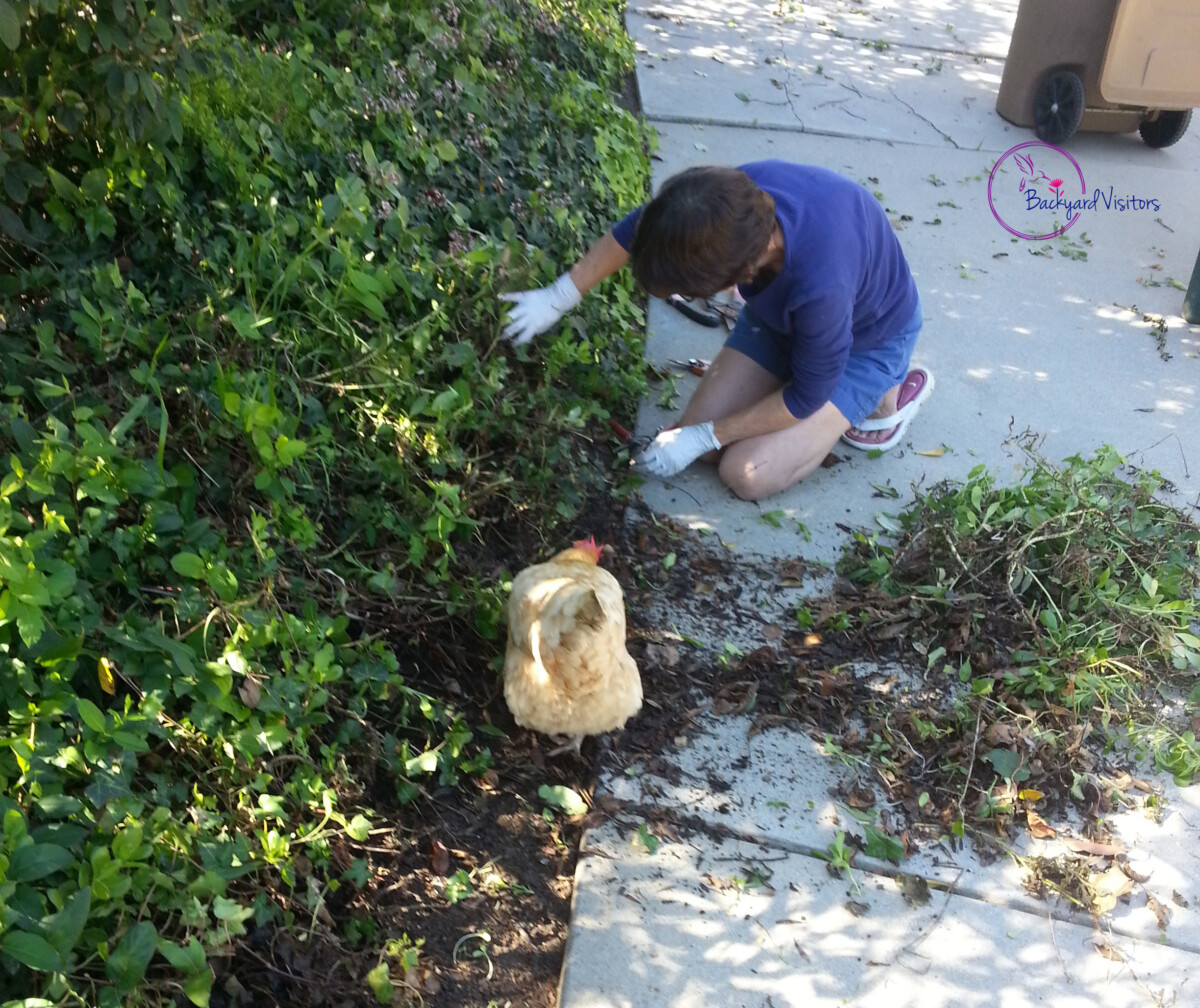
They also kept me company while I tended to my garden. If I found a caterpillar or tomato worm, I would toss it their way. One of the chickens would catch it and run away in hopes of consuming it peacefully, while the others chased her to try and get a taste.
Tending to the chickens does not mean only petting them or cleaning their habitat. Just like a dog, a chicken will follow you around as you work in the yard and sometimes nibble on a plant that they know is out of bounds for them.
Many times, my girls would pretend to be looking for bugs. When they thought that I was not looking, they would nibble on my lettuce. When I called them out on it, they would run away or look at me as if to say, “Are you talking to me? I didn’t do it! Nothing to see here!”
Chickens know their names and are fun pets. They have individual personalities. Our chicken would hop onto our window ledge and look into the kitchen window as if to tell us to come out and play.
Chickens have a keen sense of hearing in the 10-12,000 Hz range, as compared to human hearing in the 20-20,000 Hz range. They could differentiate the sound of my mom’s car from my dad’s car and would gather to greet my mom as she drove up the driveway.
Exercise is essential to keep chickens healthy and fit. Provide enough space so that they can roam freely from their chicken coops with minimal supervision.
Chickens can face common health issues such as infections, parasites, and injuries from predators; therefore, having a local veterinarian on hand will help with early treatment.
Chickens are inquisitive and intelligent animals, and hens will peck on each other if they become bored. A variety of chicken toys, such as swings, puzzle feeders, and treat hangers, will keep them active and deter boredom.
Besides these enjoyable activities, swings also help chickens with their balance and coordination. Puzzle feeders allow chickens to use their brains through problem-solving to access their food. Treat hangers and nutritious food for chickens to peck is another toy that is inexpensive.
Most people do not incubate young chicks but instead buy pullets, as I did. With gentle handling from a young age, they can become comfortable around humans, even enjoying petting and interaction.
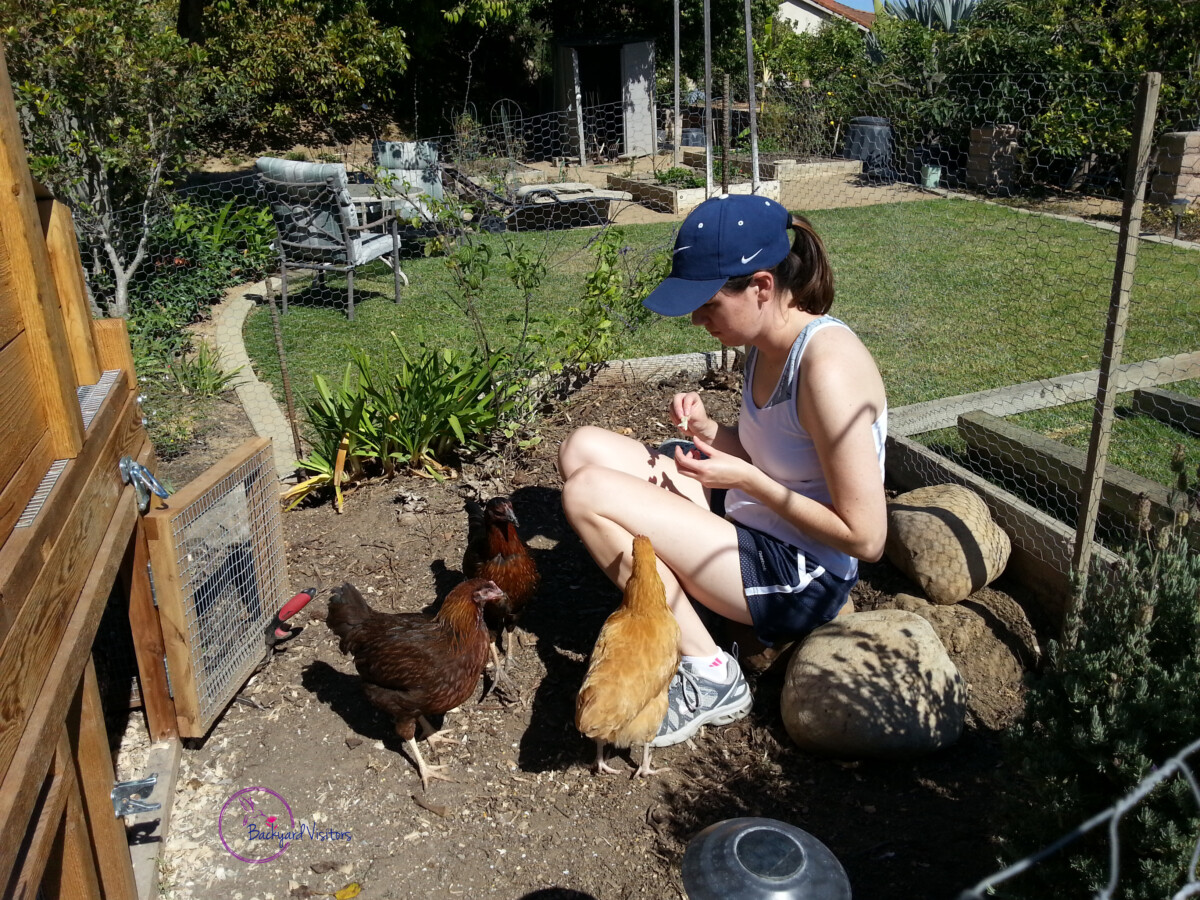
To maintain their feather and skin health, chickens groom themselves through preening and dust baths. It is important to occasionally trim their nails, which a vet can teach you how to do.
In terms of cost, expect to spend around $15 to $30 per chicken per month for food and bedding. Budget for occasional coop maintenance and veterinary care.
Chickens can make great pets, offering fresh eggs and companionship, and are considered low maintenance compared to other pets.
Consider adopting from reputable breeders or rescue groups, and be mindful of the potential challenges of dealing with roosters if you are not looking to breed your hens.
See my article: Getting to Know Roosters: A Basic Guide
Chickens can make good pets for some people. They are low-maintenance, sociable, and can provide fresh eggs. However, they require proper housing, care, and protection from predators. Before getting chickens, consider your lifestyle and local regulations.
Do Chickens Recognize Their Owner?
Chickens have the ability to not only recognize their owner’s face, but they also have the ability to recognize and remember multiple faces and respond to those faces positively, negatively, or indifferently depending on their experiences with those individuals.
Chickens, often perceived as unintelligent, possess and exhibit a range of cognitive capabilities. They are inquisitive, smart, and capable of complex behaviors.
One of the most intriguing aspects of a chicken’s intelligence is their ability to recognize and remember their human caretakers. They possess the ability to recognize their owners, form bonds, and experience a range of emotions, from negative to positive and even indifference.
Chickens are unique and have distinct personalities. They can display affection and attachment towards their human owners. While their expressions of affection may not be as overt as those of some other pets, such as dogs or cats, chickens form strong bonds with their caretakers.
They have the ability to become comfortable around their owners, seek out human interaction, and allow themselves to be handled.
Chickens can be affectionate, and playful, and even emit a soft clucking or purring-like sound when they are content, happy, and relaxed with their owners.
My chickens, Olive (Barnevelder), Ducky (Maran), Molasses (Wyandotte), Stealer (Australorp), and Carmel (Orpington), had a special relationship with my mother and with me. They were always receptive to seeing or interacting with us as we were the ones with whom they interacted most of the time.
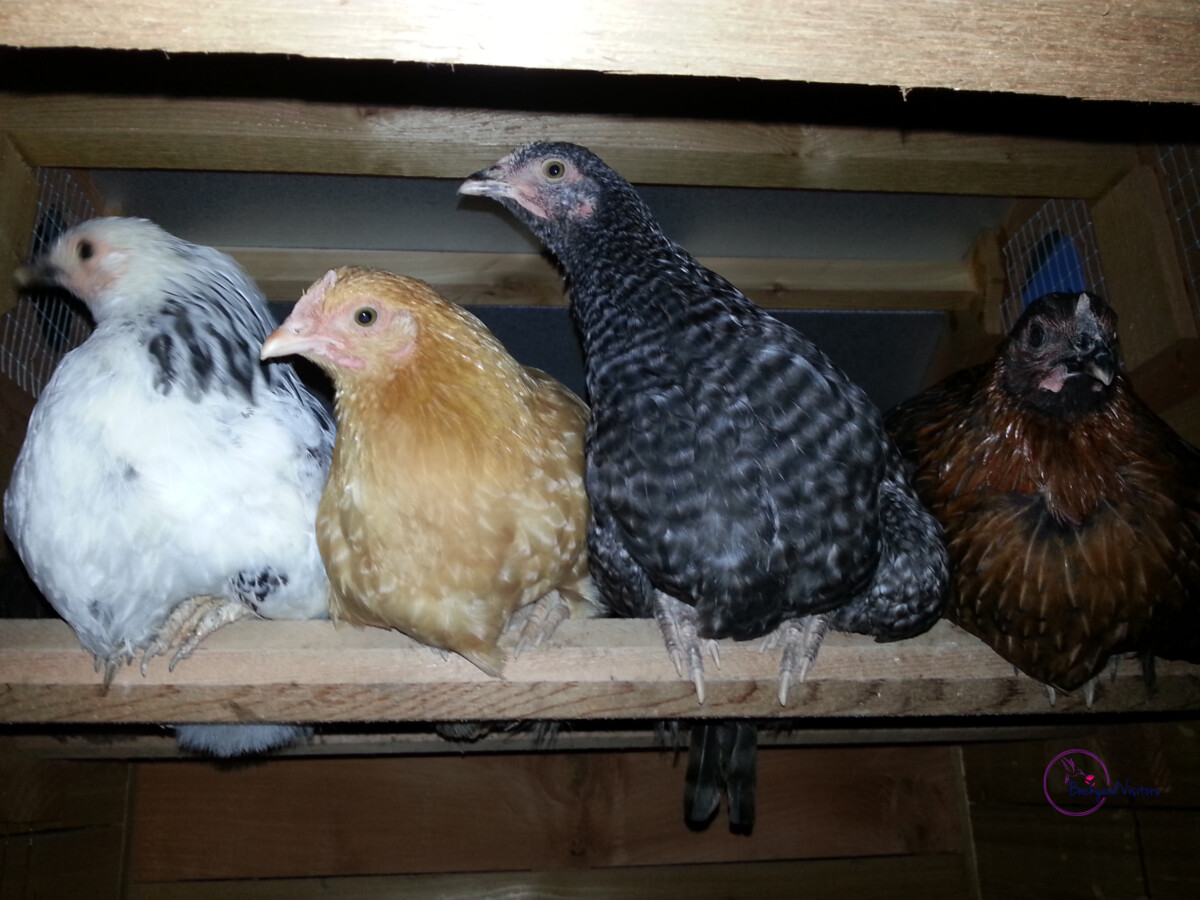
Stealer, Carmel, Ducky, and Molasses.
They looked forward daily when we unlocked their chicken coop and let them free-range in the backyard. They kept us company as we gardened, fed them grubs that we found when digging in the garden, and eagerly accepted what insects were tossed their way.
When we called them, they came from wherever they were in the backyard. Olive, in particular, would jump up on the outside kitchen ledge and look in the window when we were washing the dishes as if to invite us out to play with her.
They also knew to differentiate my mother’s car from my father’s, and when my mother drove up the driveway, they would gather to greet her.
On the other hand, they were indifferent towards my father.
When he drove up the driveway, they were not impressed. When he called them, they did not listen. They were aware of his presence but were indifferent.
While they were friendly, they did not establish that special bond with my father because he did not pay special attention to them.
When the question, “Do chickens recognize their owner?” arises, I would answer a resounding “Yes!”
To strengthen these attachment relationships, it is crucial to spend quality time with your chickens, provide them with the attention they need, and establish trust.
Chickens can recognize multiple faces and will embrace familiar faces with whom they have experienced positive interactions. They will avoid and run away from faces they recognize as negative experiences and will be indifferent to those faces where the interactions have been neutral.
They certainly had a negative response to Dave, our landscaper, who dug a trench near their chicken run while installing irrigation piping. They were quick to let him know that they did not approve.
On future encounters with Dave, they remembered and displayed a negative response toward him.
Chickens have the ability to love and care for the people who take care of them, and they are undoubtedly aware of the people they know and how they may have treated them in the past.
Do Chickens Get Attached to Humans?
Chickens are social animals and form attachments to multiple humans, which vary in degree depending on their interaction with each person. When attachment happens at an early age, they can develop strong bonds with those who provide for them.
As gregarious creatures, chickens are able to develop and form relationships with humans. The age of a chicken when first introduced to a human has a significant impact on their future relationship. Affirmative interactions from the start strengthen their bond and communication.
When they are raised from an early age with regular care like any other pet, they establish bonds and grow devoted to the people who look after them.
When raised in a nurturing and supportive atmosphere, they are especially capable of attaching to and developing relationships with people. These connections cause chickens to seek out human companionship, especially their caretakers.
They are able to recognize faces and associate them with either happy or unpleasant memories. Chickens can get close to the people who look after them and preserve memories of how they were treated.
They have the capacity to recognize individuals, including humans, and can form lasting attachments.
These attachments can lead to chickens remembering and feeling comfortable around familiar humans and also seeking out attention and affection from these individuals.
The level of attachment can vary among individual chickens and species, just like any other pet. Some may be more outgoing and affectionate, while others are more reserved.
When it comes to happiness and their well-being, chickens display behaviors such as playfulness, contentment (purring), and a preference for positive environments. These behaviors can serve as indicators of their emotional state.
Chickens exhibit behaviors such as deception, empathy, and self-control, indicative of their remarkable cognitive and emotional depth.
Chickens can also be cautious and wary of unfamiliar humans or situations, which is a natural survival instinct. However, with patience and gentle handling, many chickens can overcome their initial hesitations and form trusting relationships with humans.
They share similar characteristics with traditional animal companions, as chickens can be inquisitive, playful, and affectionate. Whether raising chickens on the farm or having them as a family member or pet in your backyard, chickens attach to their human caregiver.
Do Chickens Learn Their Names?
Chickens recognize their own name when they are repeatedly called in a positive fashion. They are also able to differentiate when another chicken in the flock is addressed using its individual name.
When consistently addressed by name, chickens show the ability to learn and respond to their names, proving they have the element of name recognition.
Chickens can also recognize the names of other chickens in their coop.
They display a surprising degree of cognitive ability and are just as intelligent as certain domesticated animals, such as dogs and cats.
They will learn, recognize, and understand their names when they are frequently used, especially in a gentle and loving manner. They will respond by turning to look at you when addressed by name.
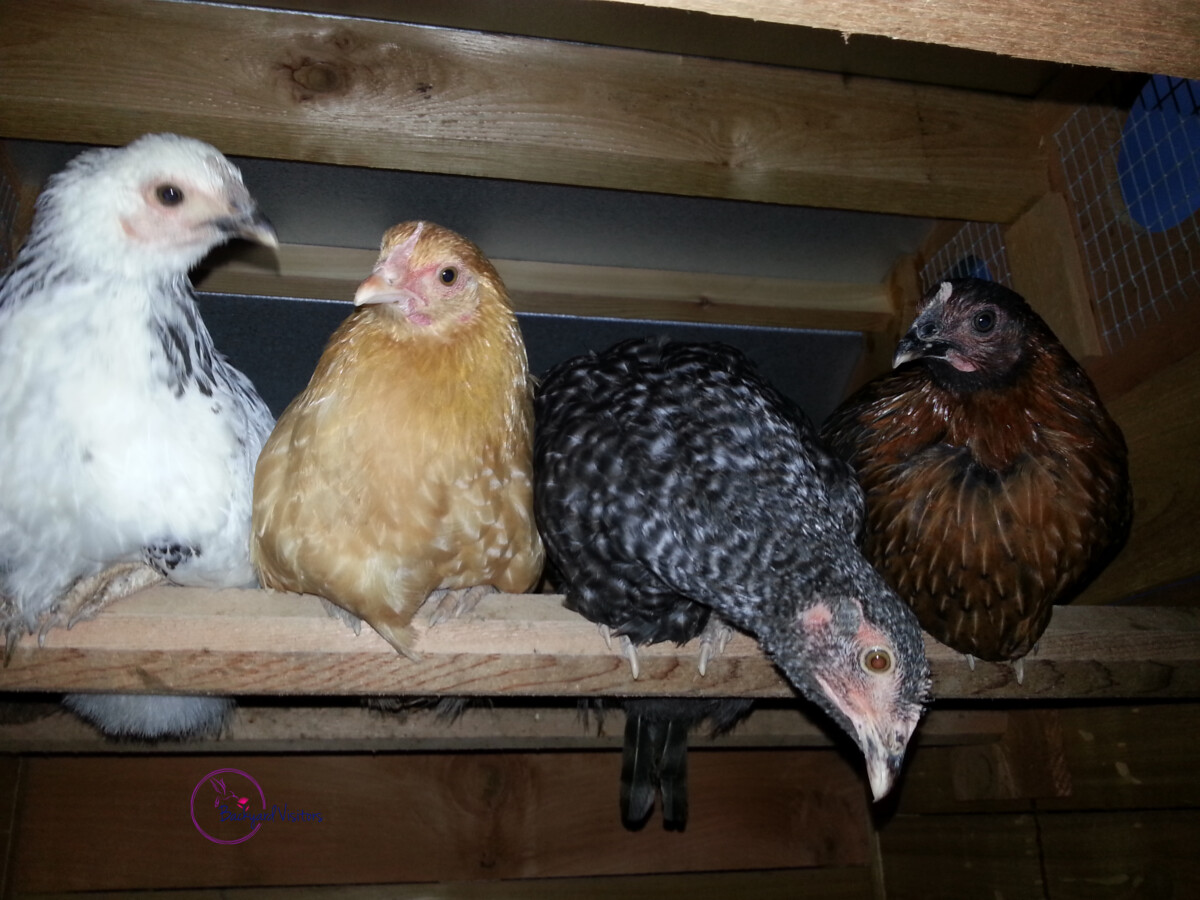
Stealer, Carmel, Ducky, and Molasses all know their names.
Ducky is the weird one, sounds more like a duck than a chicken!
All five of my chickens, Olive, Carmel, Molasses, Ducky, and Stealer, know their names and respond when we call them. If one is doing something it should not be doing, such as eating the lettuce in my raised bed garden, only that chicken responds when I verbalize its name and reprimand it. The others will continue to peck for bugs and will not be bothered by the reprimand.
Do Chickens Let You Pick Them Up?
Chickens, though not conventionally regarded as affectionate, will allow you to pick them up when you use proper lifting and holding techniques. Encourage them to approach you and reward them when you return them to the ground by using positive reinforcement, such as treats like mealworms.
Backyard chickens can become quite comfortable with their human caretakers. They often enjoy being held, petted, and spoken to in a gentle manner.
Do not chase hens. To protect the safety, comfort, and well-being of both you and your chickens, use proper handling procedures. They are tense and anxious when being pursued.
Train them to come to you by using positive reinforcement, such as food or especially mealworms, which are like candy to them. Before long, they will associate your presence with treats and come running to you when you call.

Some say that it is best to gently guide them into a corner before picking them up. Place one hand on their back, avoiding their wings and tail feathers. Use your other hand to secure their legs and lower body. Lift them slowly and keep them close to your body to prevent them from flapping or jumping, which could lead to injury.
Maintain a delicate balance between holding them securely in your arms and avoiding causing any harm. Keep them calm and comfortable throughout the process.
Never pick up a chicken by its feet or neck, as this can cause both mental stress and physical harm.
Once you have your chicken in your arms, pet them gently and speak to them softly. This will help them relax and get used to being handled by humans.
When holding them, consider that you are carrying a football. Place your hand under their feet and chest, and tuck their rear end between your elbow and body. Avoid restricting their view, as it can make them nervous.
After you have enjoyed some quality time with your chicken, gently place them back down and offer them a small reward of food for a job well done. This reinforces the idea that being handled is a positive experience.
As you gain confidence in handling your chickens, it will become a routine for both you and your chicken companion. With patience and care, you will build a bond with your chickens and enjoy the rewards of their company.
Remember, just like any other pet, chickens can be trained to adapt to human interactions and develop positive behaviors.
All five of my chickens responded well using these techniques.
Do Chickens Enjoy Being Held?
Chickens can become accustomed to humans handling them and learn to enjoy being held, however since individual chickens have varying preferences, not all are comfortable with being handled.
Many backyard chickens are comfortable being picked up and handled by their caregivers.
The initial reaction of an untrained chicken is to flee from what they consider as danger, therefore, if you attempt to catch it, it will inevitably attempt to escape.
The trick is to teach your backyard chickens at an early age to learn to enjoy human interactions, and they can be taught to be held, especially by their owner.
If you begin handling a hatchling, they will have already imprinted on you and consider you to be its “mommy”. In this case, it is easy to pick up the chicks. Regular hand feeding will also teach your hens that you are their food source and they will come running when you call.
Most chickens fall into the category of intermittent human contact. That means they are used to humans but are not cozy with them. They have to learn to not mind being held, as their initial reaction is to attempt to flee. Once dominance is established by the caregiver, the hens will calm down and be submissive.
Catching, handling, and holding your chickens is a pleasant experience if performed correctly.
Avoid chasing your chickens. Instead, encourage them to come to you by offering them treats such as mealworms or food pellets. They will positively associate your presence with food and come running to you.
When they are close to you, place both hands on each side of their wings and apply gentle pressure to scoop them up into the pocket of your dominant arm. Keep their wings nestled between your arm and chest for comfort and safety.
Another way to safely catch them is to place your hand on the middle of their back to get the hen to squat. The squatting position is the hen showing submission. Once you have the hen gently pinned down, place your hands on both wings so that they are not able to flap their wings, gently scoop them up, and place the hen close to your body, tucked under your arm.
Use your arm to secure the hen in position. Once the hen feels secure that they are not able to flap or run, they will calm down. When the hen is in a position close to your body, use your hand and hold their feet so that they are not able to scratch you.
Hold your chickens firmly enough for them to feel secure but not so tight as to cause discomfort.
Never pick up a chicken by its neck, tail, wings, or feet as this will cause both mental stress and physical harm.
Once you hold the chicken in your arms, calmly pet and converse with it. The hens need to be reassured that you are the dominant one and in charge so that they become more at ease and accustomed to human contact as a result.
Reward your chicken with mealworms or food pellets as you pet and converse with them, as well as when you set them back on the ground, to ensure that their experience is positive. This helps them associate handling with something enjoyable.
With some patience and care, you will build a positive bond with your backyard chickens and make their interactions with you a pleasant experience for everyone involved.
I certainly enjoy picking up and holding our pet chickens. This is a great experience that makes me feel close and connected to them..
Do Chickens Like When You Talk To Them?
Chickens enjoy human interaction, especially if it is associated with food. Presenting treats when they respond to your call reinforces their interactional behavior. Talking to them, singing, and whistling helps chickens associate with their caregiver in a positive way.
Chickens, especially backyard chickens, are known to respond positively to human interaction. These social birds appreciate vocal communication, which greatly enhances the bond and fosters a deeper connection between chicken keepers and their flock.
Engaging in conversations, singing, whistling, offering treats, and gentle touch are all ways through which humans can communicate, interact, and engage with their chickens. These interactions contribute to the well-being, contentment, and social connection of these avian companions.
Communicate with your chickens in four easy steps:
Basic Chatting: Whether you are visiting the coop in the morning, watching them free-range in your backyard, or tucking them in at night, take the opportunity to chat and gently talk with your chickens. This will give them the opportunity to become familiar with your voice and associate it with positive energy.
Some may be more talkative than others, with their own unique clucks and coos. Addressing them by their names can reinforce their ability to recognize their names and strengthen your relationship.
Singing: Chickens love and respond to music! They appreciate smooth and pleasing melodies. Research has shown that they prefer consonant music. Consonant music is composed of tones that blend well together when played simultaneously in a harmonious and pleasing way, creating a soothing and enjoyable listening experience.
Whistling: Whistling is an effective way to get your chickens’ attention. You can use a simple two-note whistle to signal mealtime or bedtime. Like many animals, chickens are motivated by food. Whistling to your hens to return to the coop or home base is another way to check on their well-being during the day if they are allowed to roam free. Make sure to reward them with a treat when they respond.
They will quickly learn to associate your whistle with positive things and build trust, especially when tasty mealworm treats are provided for positive reinforcement.
Physical touch, along with gentle talking, is another way to communicate with your chickens. Holding, cuddling, and petting them can show affection and build trust. Chickens that are well cared for and treated with compassion tend to be tamer and friendlier.
Talking to your chickens is a great way to strengthen your bond with them and provide mental stimulation. They enjoy social interaction and will respond in their own unique ways.
Chickens have a natural inclination to be vocal, and they will respond to your voice when you talk to them. It’s almost like chatting with toddlers who are just starting to grasp the magic of language. This interaction is not only enjoyable but also essential for building a strong bond with your chickens.
Why You Should Sit With Your Chickens?
Sitting with your chickens is essential for their social and emotional well-being as they benefit from human interaction. Spending time with your chickens allows you to bond, understand their behavior, and provide enrichment, ensuring their happiness and health.
Chickens are highly social and intelligent animals that benefit from human interaction.
Sitting with your chickens is essential to meet their social and emotional needs, allowing time to bond and to prevent potential health and behavioral issues.
Chickens thrive on social interaction, as they are not solitary birds. They crave companionship, often forming strong bonds with their fellow chickens as well as with their human caregivers.
Sitting and talking with your chickens is rewarding. They have their own vocabulary, consisting of approximately 30 words and short phrases. For example, they use a special vocalization called “tidbit” to announce tasty discoveries and have distinct calls for alerting the flock to dangers or announcing freshly laid eggs. By spending time observing them, you will become attuned to their communication.
Chickens often enjoy affection, such as cuddling, stroking, and even light massages. Spending time with your chickens reveals their intricate social hierarchies and quirky personalities.
Chickens, being intelligent and curious creatures, benefit greatly from various enrichment activities or objects that stimulate their minds and senses. You can explore different categories, including auditory, visual, olfactory, textural, and edible enrichment, to keep them engaged and prevent boredom.
Here are some activities to do with your chickens:
Hand-feed fresh fruits and vegetables that are non-toxic like watermelon, corn, or cooked pumpkin. These sources offer liquid to replenish water in the body on hot days.
Dig in your backyard or turn over compost and watch your chickens thrive in their environment, scratching and searching for bugs and worms to eat. Chickens love digging and scratching through materials like mulch, sand, dirt, or leaves.
This activity offers entertainment for both parties, companionship, and nourishment for your chickens with protein-rich bugs that are considered pests in your backyard.
Talk to them to take advantage of the chance to chat and softly converse with your hens, whether you are visiting the coop in the morning, watching them roam free in your backyard, or tucking them in at night. They will have the chance to become accustomed to your voice and develop an optimistic association, especially when you call them by their name.
Add music to their environment with melodies that are mellow with consonant music. This refers to tones that sound good together when performed at the same time in a harmonious and attractive manner.
While your chickens dig in the dirt looking for bugs and keeping you company, play some soft, relaxing, and enjoyable music in the background.
These connections fulfill important social and emotional needs for chickens. Ignoring them can lead to loneliness, depression, and physical health issues.
Sitting with your chickens can be a rewarding experience, fostering connections, understanding their language, and providing them with enriching activities.
My five chickens, Carmel, Ducky, Steeler, Olive, and Molasses, all responded positively to the activities suggested above.
When they were sitting on my lap being petted, I was frequently conversing with someone else. This helped them learn my voice and intonations so that they felt comfortable on my lap.
Often, Carmel would fall asleep on my lap while I gently petted her. All five of them learned to associate sitting on my lap as a positive experience and would seek me out for their daily pettings.
There was an incident where Carmel felt comfortable enough to lay her egg while sitting on my lap. This is evidence that sitting with chickens is favorable.
Check out my other posts on Backyard Chickens
Enjoy Training Your Backyard Chickens Into Pets!
Backyard Visitors participates in affiliate programs which compensate us for referring traffic.

